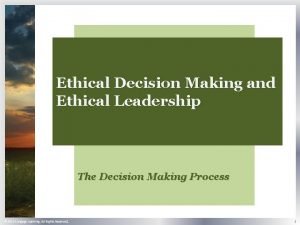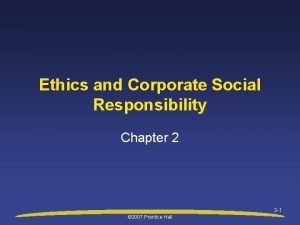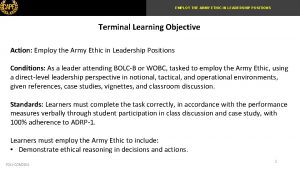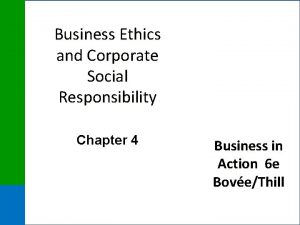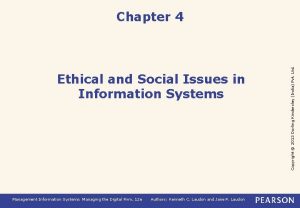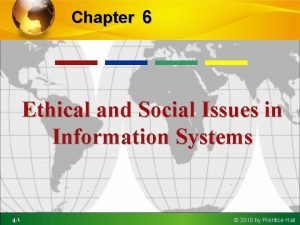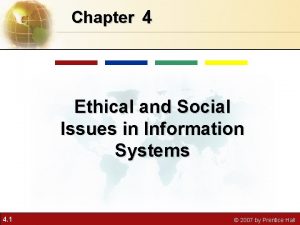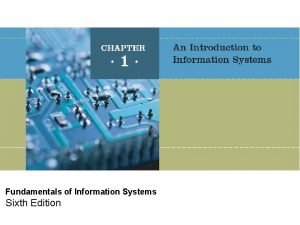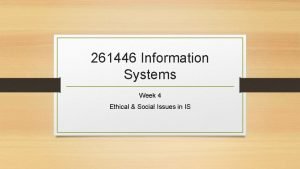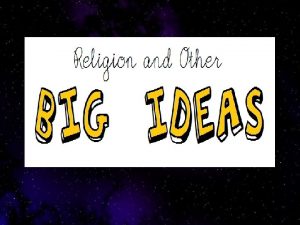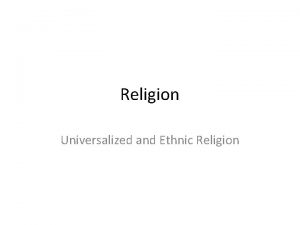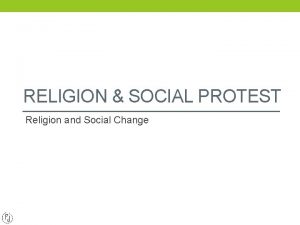Religious and Ethical Systems 1 of 8 Religion













- Slides: 13

Religious and Ethical Systems 1 of 8 § Religion - a system of shared beliefs and rituals that are concerned with the realm of the sacred § Ethical system – a set of moral principles, or values, that are used to guide and shape behavior § Religions with the greatest following ü Christianity (2. 20 billion adherents) ü Islam (1. 60 billion adherents) ü Hinduism (1. 10 million adherents) ü Buddhism (535 million adherents) ü Confucianism shapes culture in many parts of Asia ©Mc. Graw-Hill Education.

Map 4. 1 World Religions Source: “Map 14, ” Allen, John L. , Student Atlas of World Politics, 10 th ed. Mc. Graw-Hill Education. ©Mc. Graw-Hill Education.

Religious and Ethical Systems 2 of 8 Christianity ü Most widely practiced religion ü In 1904, Max Weber suggested that it was the Protestant work ethic (focus on hard work, wealth creation, and frugality) that was the driving force of capitalism ü Protestantism gave individuals more freedom to develop their own relationship with God which may have paved way to economic freedom ©Mc. Graw-Hill Education.

Religious and Ethical Systems 3 of 8 Islam ü Adherents of Islam are referred to as Muslims ü One true omnipotent God ü In the Western media, Islamic fundamentalism is associated with militants, terrorists, and violent upheavals ü Fundamentalists have gained political power in many Muslim countries, and have tried to make Islamic law the law of the land ©Mc. Graw-Hill Education.

Religious and Ethical Systems 4 of 8 Islam continued ü Economic Implications of Islam § Koran establishes explicit economic principles many of which are pro -free enterprise § Under Islam, people do not own property, but only act as stewards for God and thus must take care of that which they have been entrusted with • Islam is supportive of business, but the way business is practiced is prescribed • Businesses that are perceived to be making a profit through the exploitation of others, by deception, or by breaking contractual obligations are unwelcome ©Mc. Graw-Hill Education.

Islamic Banks Islamic banks function differently than conventional banks in the world, as the Islamic banks cannot pay or charge interest. Source: © Ali Al Saadi/AFP/Getty Images ©Mc. Graw-Hill Education.

Religious and Ethical Systems 5 of 8 Islam continued ü Economic Implications of Islam continued • Prohibits payment or receipt of interest • Mudarabah • Similar to profit sharing • Murabaha • Most widely used • Includes a price markup ©Mc. Graw-Hill Education.

Religious and Ethical Systems 6 of 8 Hinduism ü World’s oldest religion ü Moral force in society requires the acceptance of certain responsibilities called dharma ü Believe in reincarnation and karma ü Individuals should be judged by their spiritual achievements ü Promotion and adding new responsibilities may not be the goal of an employee, or may be infeasible due to the employee's caste ©Mc. Graw-Hill Education.

Religious and Ethical Systems 7 of 8 Buddhism ü Suffering originates in people’s desire for pleasure ü Stress spiritual growth and the afterlife, rather than achievement while in this world ü The Noble Eight Path ü Buddhism does not support the caste system, so individuals do have some mobility and can work with individuals from different classes ü Entrepreneurial activity is acceptable ©Mc. Graw-Hill Education.

Religious and Ethical Systems 8 of 8 Confucianism ü Until 1949, official ethical system of China ü Not a religion ü High moral and ethical conduct and loyalty to others ü Attain personal salvation through right action ü Three key teachings of Confucianism - loyalty, reciprocal obligations, and honesty - may all lead to a lowering of the cost of doing business in Confucian societies ©Mc. Graw-Hill Education.

Focus on Managerial Implications 1 of 3 CROSS-CULTURAL LITERACY AND COMPETITIVE ADVANTAGE There is a need for managers to develop cross-cultural literacy 1. There is a connection between culture and national competitive advantage 2. There is a connection between culture and ethics in decision making ©Mc. Graw-Hill Education.

Focus on Managerial Implications 2 of 3 Cross-Cultural Literacy ü Firms that are ill-informed about the practices of another culture are unlikely to succeed in that culture ü Individuals must also beware of ethnocentric behavior § Belief in the superiority of one's own culture ©Mc. Graw-Hill Education.

Focus on Managerial Implications 3 of 3 Culture and Competitive Advantage ü Connection between culture and competitive advantage § It suggests which countries are likely to produce the most viable competitors § It has implications for the choice of countries in which to locate production facilities and do business ©Mc. Graw-Hill Education.
 Ethical habits
Ethical habits Western religion vs eastern religion
Western religion vs eastern religion Perbedaan ethical dilemma dan ethical lapse
Perbedaan ethical dilemma dan ethical lapse Army ethical lenses
Army ethical lenses Chapter 4 business ethics and social responsibility
Chapter 4 business ethics and social responsibility Ethical and social issues in information systems
Ethical and social issues in information systems Ethical and social issues in information system
Ethical and social issues in information system Chapter 4 ethical and social issues in information systems
Chapter 4 ethical and social issues in information systems Chapter 4 ethical and social issues in information systems
Chapter 4 ethical and social issues in information systems Ethical and social issues in information systems
Ethical and social issues in information systems Religious symbolism in the old man and the sea
Religious symbolism in the old man and the sea Religious and classical roots
Religious and classical roots Cognitive and non cognitive religious language
Cognitive and non cognitive religious language If i profane with my unworthiest hand
If i profane with my unworthiest hand
